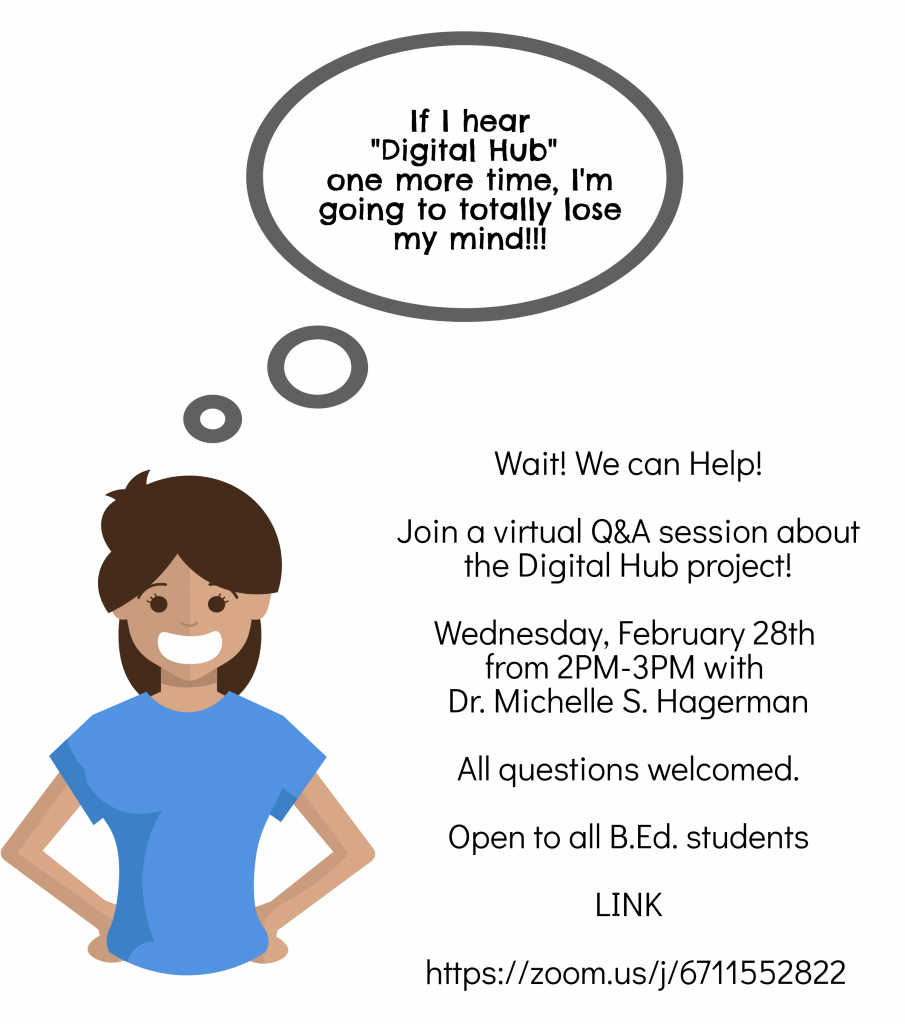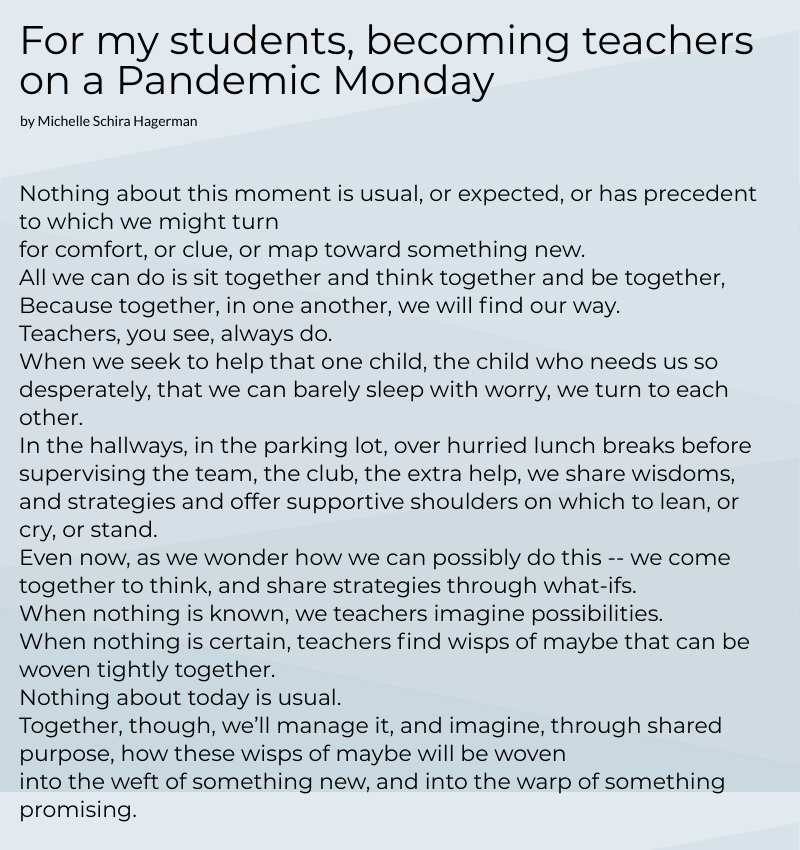 ]]>
]]>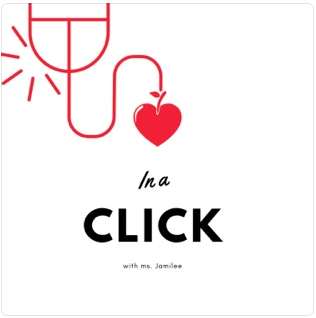
I had the chance to meet up with Jamilee Baroud this week to record an episode for her new Podcast called In a Click. Jamilee is an up-and-coming superstar in the ed-tech/critical digital literacies research community and it has been such a privilege to work with her during her PhD program at the University of Ottawa Faculty of Education. Here’s our conversation — 40-ish minutes of us talking about technologies, research, teaching and learning, deep fakes, embodied cognition, VR, makerspaces…and my first ever research project that helped me to reflect deeply on the complexities of digital technologies, teaching and learning. It as a lot of fun to do this — and I feel really lucky to have been invited onto Jamilee’s show.
I hope you will join me in following Jamilee’s work at In a Click as she shines light online.
Photos to follow 
]]>
Audience: For Graduate Students at the Faculty of Education, University of Ottawa
Conference:
What if? Reimagining Education to Transform Learning, Teaching & Knowing
Jean-Paul Dionne Symposium 2018
Faculty of Education, University of Ottawa
Slides below — with embedded links to materials used during the workshop.
]]>When: Wednesday, February 28, 2018 at 2 PM Eastern time.
Where: https://zoom.us/j/6711552822
]]>
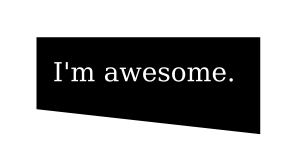 Teacher candidates have asked me this question in a variety of ways. Sometimes, they say they’re not comfortable putting themselves “out there”. Other times, they tell me they’ve never really shared their ideas publicly before, and this makes them nervous. Sometimes, they say they just want to keep their thoughts private. In conversation with experienced teachers, a similar theme has often emerged too. Teacher candidates are not alone in this worry. When we talk about working and serving students in a world where the Internet is the most important medium for literacies learning, even seasoned teachers get a little nervous.
Teacher candidates have asked me this question in a variety of ways. Sometimes, they say they’re not comfortable putting themselves “out there”. Other times, they tell me they’ve never really shared their ideas publicly before, and this makes them nervous. Sometimes, they say they just want to keep their thoughts private. In conversation with experienced teachers, a similar theme has often emerged too. Teacher candidates are not alone in this worry. When we talk about working and serving students in a world where the Internet is the most important medium for literacies learning, even seasoned teachers get a little nervous.
I discussed this with a teacher at a conference last spring. She was a woman, probably mid-forties-ish like me, who by any reasonable assessment had PLENTY of amazing ideas to share. She told me, “You know, as a girl, I was socialized to not have opinions, and especially to not have or express controversial ones. As an adult, even though I know I have ideas that others would be interested in hearing, I struggle to share them. I just feel like I shouldn’t stand out, or present myself as some kind of expert. It just feels socially unacceptable to have a website focused entirely on me and my ideas.”
Given all of this, when the B.Ed. program asks students to create a representation of self — of a professional self that is emerging and that they cannot yet know — we recognize that for many, this feels incredibly hard, and for good reason. We are asking students who don’t yet know who they are as teachers to write about themselves and their work in a public space.
The Digital Hub strategy asks teacher candidates to construct new professional identities and to share these identity shifts with others. For many, this may call into question years of living and moving in the world as quiet, polite, self-effacing, agreeable people. This activity may conjure worries about what will happen. What if, for example, they are viewed and judged by others as a tall poppy? I imagine the self-talk might go something like this: Sharing ideas, and taking credit for all of my good work on the Internet? Other people do this, not me. Usually, those people are famous. Or wanting to become famous. Or they’re Youtubers. Or they’re attention-seeking narcissists. These labels definitely do not apply to me. Plus, there are trolls on the Internet. There are bullies on the Internet. There are good reasons to not be public on the Internet.
In her 2005 book, Places of Learning: Media, Architecture and Pedagogy Elizabeth Ellsworth writes about transitional spaces. She writes, “Unlike spaces that put inside in relation to outside in an attempt to make the inside comply with the outside, transitional space opens up a potential for learning about the outside without obliterating the inside […] Transitional space allows us to use the environment to get lost in oneself, to make a spontaneous gesture, to get interested in something new, to surprise oneself, to organize bits of experience into a temporarily connected sense of self and then to allow those bits to un-integrate so that they can be surprised by themselves and reconfigured in new ways. And, so they can be reconfigured into new thoughts and ways of being with self and others.” (p. 61).
I think that Digital Hubs in Teacher Education can be transitional spaces. They may call into question how many of us live and move in the world but they also open up possibilities for new discovery. They invite us to surprise ourselves. They are an invitation to reconfigure bits of self into something our selves have never been before.
As a professional preparation program, we know that we are asking teacher candidates to think in challenging new ways about who they are becoming as teachers. But, as I write on the Institutional Vision page and in the introduction to the Digital Hub, there is much to be gained from an authentic investment in this work. Although many candidates might see the real purpose of a website as a way to position themselves in the job market, we see it as an opportunity to scaffold transition. We see the digital hub as an opportunity for every teacher candidate to learn essential digital literacies skills that serve teaching and learning purposes, to think deeply and make decisions about the very real tensions that now exist between their lives as private citizens and their professional lives as public intellectual workers. We see it as a place to engage in the processes of professional reflection that teachers have always done as they learn and grow. Substantively, it will be the content of the digital hubs that showcase each teacher candidate’s fit for the jobs to which they apply in future. So, as with everything about learning, it’s the journey, the process, and the getting there that prepares us for what’s next.
To me, owning one’s story and sharing the great work that one does as a teacher is not shameless self-promotion. Rather, as teachers, we enter into these open spaces because we are committed to bringing all that we are and all that we do to serve the public interest. As a teacher myself, I feel a deep and enduring responsibility to make my work visible to the public I serve. I know that students who don’t know me won’t choose to learn from or with me. If they can Google me and learn about what I do, what I have written, where I used to work, the kinds of things I value — then maybe that helps some students to identify a connection they wouldn’t otherwise have been able to make. As a researcher, I also know that colleagues who don’t know my work won’t choose to work with me, or choose to learn from the things I have written. So, in this way, being open about my thinking allows me to connect with others who do similar work. It opens opportunity for collaboration and learning. Fundamentally, I use the Internet as one way to fulfill my responsibilities to teaching and to the stakeholders I serve. And service — I am pretty sure that is a shared value that brings all of us to this profession.
We did all of this work inside of Google Classroom — but today, when I went to access that space, I discovered that my Google Classrooms had disappeared from my institutional account. Without warning. This is one of many reasons that teachers hate technology. Systems and IT policies can undermine the real educational affordances of digital tools. I assumed — erroneously — that my students would always have access to the classroom we built together. And today, I found out the hard way that that wasn’t the case.
So, just in case some of my hard-working students are looking for access to those same resources (Tereza S.?!) here they are — hyperlinked for your use.
Social Media Guidebooks
The Preservice Teacher’s Guide to Social Media in the Classroom
(Created by Intermediate-Senior Teacher Candidates in PED 3119, March 2017)
The Preservice Teacher’s Guide to Social Media in the Classroom
(Created by Primary-Junior Teacher Candidates in PED 3119, March 2017)
Tech Tips with Notes on Effective Pedagogical Integrations
TechTip Synthesis (Intermediate-Senior Teacher Candidates)
TechTip Synthesis (Primary-Junior Teacher Candidates)
Course Syllabus
If you were a member of one of these PED 3119 classes and are looking for other resources, please contact me directly and I will do my best to provide them to you.
]]>
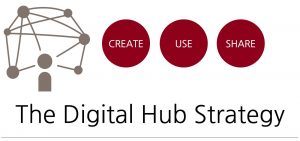
Students in the Teacher Education program at the University of Ottawa will be expected, for the first time this fall, to create a professional website that documents their development as teachers. Faculty members have piloted this project over the past couple of years and in the spring of 2017, we gathered some survey data from graduating students who created professional digital websites in courses and as part of cohort-based initiatives that has helped us to develop a guiding framework for the launch of this project program-wide. Here are some key take-aways from that survey.
- Students tended to think of their digital hubs as an online CV rather than a digital identity text, or as a space for developing new understandings of themselves as teachers through curation, reflection and revision.
- Students wanted more explicit direction from the program about what to include — at least at first.
- Students who created a website did it because they had to as part of a course or because the program was expecting it of them in some way.
- Students told us that, at first, they did not have the technical skill set required for the development of a professional digital hub. Many said they struggled to acquire these skills as they were also learning how to teach.
- Students told us that they needed more support around issues of identity management, privacy and how to ethically and responsibly share their work and their students’ work on the open Internet.
Students entering our program this year will learn, at Orientation, about the Hub, its purpose, and the rationale driving our programmatic choice to integrate it as part of their professional preparation program. Broadly, we see the Digital Hub as one way for teacher candidates to develop foundational professional digital literacies skills while also curating a set of documents that reflect their emerging skills, values and competencies as teachers and teacher researchers.
Information about the Digital Hub initiative can be found at http://sites.google.com/site/edtechuo
This site is for students, but also for Faculty members looking for tips, strategies and resources to support their students’ emergence as digitally literate professionals.
]]>Je vais présenter aujourd’hui (le 29 mai) les analyses que j’ai faites avec mon collègue et assistant de recherche, Kamal Imikirene, à la réunion de la Société canadienne des études en éducation.
Voici les diapos.
]]>
